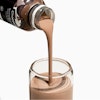🔥 Bestseller


High-protein meal shakes
35g protein
400 cal per bottle
From $58
/ $4.83 per bottle
2
Alcohol is well documented as something we should limit for our health, with guidelines recommending that we limit alcohol consumption as much as possible or avoid it altogether. Here in the US, it is generally recommended that women limit their intake to one drink per day and men 2 drinks per day. But can even moderate alcohol consumption impact our time in the gym? Let’s take a look at the literature.
While the mechanisms of how alcohol consumption can impact muscle building are still being researched, several studies show that both chronic and acute alcohol use can impact our muscles. Chronic alcohol abuse is known to cause myopathy, which is a weakness of the muscles, and can have a downstream effect on health including bone loss and mobility. But can a casual drink impact gains?
Research suggests muscle recovery can be impacted even by acute alcohol consumption. Some studies showed alcohol consumption was associated with reduced power and force even 36 hours after the workout. When consumed just a couple hours after exercise, alcohol may limit muscle protein synthesis, which is how our bodies build muscle. To make the most of your resistance and strength work outs, it might be best to save happy hour for another day.
After we exercise, it is important to eat a meal or snack that supports recovery. This should include a source of protein and carbohydrates to support both muscle protein synthesis as well as replenish glycogen stores. Alcohol is not a good source of either of these, so it should be left out of your post-workout meal.
But alcohol is not only devoid of the nutrients you need to adequately recover from exercise, it can also interfere with your body’s ability to absorb nutrients from our food. Alcohol inhibits the absorption of essential nutrients in our small intestine, including macronutrients like amino acids (protein) and micronutrients like vitamins and minerals.
Alcohol can make you feel tired, but it actually reduces the quality of your sleep by disrupting our natural sleep patterns. This can lead to a restless night of sleep, where you may wake up frequently, sleep lightly or find it difficult to fall back asleep. Sleep quality plays a critical role in athletic performance, so getting consistent quality sleep is important for optimizing your training. In order to maximize your sleep, it is best to limit your alcohol consumption, and avoid drinking the couple days leading up to competitions or important training sessions.
Hydration is a vital component when it comes to training (and competing!). If you are not properly hydrated, muscle function, endurance, flexibility, and speed can suffer. Alcohol is a diuretic, which means it can dehydrate us. Leading up to your training or gym session, put down the beer and pick up the water bottle. For those who are engaging in intense/long exercise sessions, or exercising in a particularly hot climate, a sports drink with electrolytes can also be beneficial for proper hydration. In general, to help reduce dehydration on a night out, be sure to drink plenty of water during and after alcohol consumption.
TL;DR Alcohol consumption may impact muscle building. Due to alcohol’s lack of nutrition, negative impacts on sleep, and ability to dehydrate us, it is best to avoid alcohol consumption around your training sessions, and focus on adequately fueling and hydrating.
Get 15% off your first order of $50, plus insider access to expert tips, exclusive discounts, and the latest from Huel.
This site is protected by reCAPTCHA and the Google Privacy Policy and Terms of Service apply. You can unsubscribe at any time. Huel Privacy Policy.
